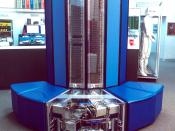Running head: NATIONAL SECURITY AGENCY
National Security Agency
National Security Agency
Student's name
Institution's Name
NATIONAL SECURITY AGENCY
INRODUCTION
The National Security Agency is a branch of the United States central government whose function is particularly to safeguard information that is sent from the United States, and to decipher information that is sent or may be sent out by other nations (Aid, M. M., 2009). Generally, such information is encrypted, and therefore the NSA has several employees who focus on decoding material, also referred to as cryptanalysis. This agency became much better known in the twenty first century for its increased role in domestic shadowing of things such as phone calls, sometimes referred to as domestic spying. This analysis has resulted to a serious argument on the extent to which the National Security Agency should be authorized to assess the confidential communications of citizens who may have been thought to associate with terrorist groups but have not been proven (Sanger, D.
E., 2013).
FUNCTIONS OF NSA AS IT RELATES TO COUNTER TERRORISM OPERATIONS IN US
National security agency's capture of terrorist communications regularly raises alarm elsewhere in the United States government. National Security Agency's engineers create sophisticated systems to cut out codes and to make sense of the present complicated signals environment. The agency not only scrutinizes communications through phone, radio, Internet, and television but also listens to conversations between foreigners that are not meant for them (Sanger, D. E., 2013). They also perform study of technological communications systems and ciphers as well as foreign organizational structures, those of terrorist organizations inclusive. This is also referred to as traffic analysis. The primary role that NSA has come to take up in domestic intelligence has never been disclosed to the public but recent research shows that its effort has developed more...


